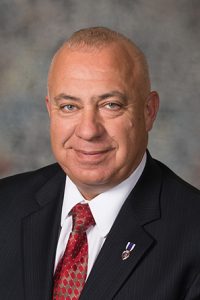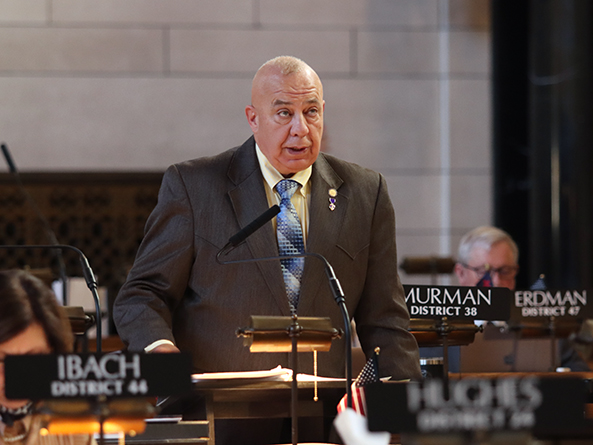Private renewable energy meeting requirement clears first round
A bill seeking to harmonize requirements for public and private energy generation facilities in Nebraska advanced from general file April 3 after lawmakers voted to narrow the proposal.

LB399, as introduced last session by Sen. Tom Brewer of Gordon, would require any privately developed renewable energy generation facility to file an application with the Nebraska Power Review Board seeking approval of the project and to hold a public meeting.
Within 10 days of an application, the board would schedule a public hearing, to be held within 60 days, and give notice to those the board deems to be affected by the proposal.
The board would approve the application after the hearing if it meets the criteria certified to in the application, unless such approval were outweighed by any testimony or evidence in opposition to the application offered by power suppliers, other interested parties or members of the public.
A Natural Resources Committee amendment would replace the bill. Under the amendment, an application would be approved if the board finds that it meets the certified criteria, would “serve the public convenience and necessity” and that the applicant can most economically and feasibly supply the electric service resulting from the proposed construction or acquisition without unnecessary duplication of facilities or operations.
The amendment would apply only to a proposed electric generation facility with a generating capacity greater than 10 megawatts. It would retain the public meeting requirement and specify that the meeting be held in one of the counties in which the proposed facility would be located and that at least 50% of the governing body of the electric supplier attend either in person or by videoconference. At least one member would be required to be physically present.
Brewer said it should not be too much to ask for private energy developers to be required to meet with those who would be impacted by the construction of their facilities. Wind energy has “torn apart” families and communities in rural Nebraska, he said, and neighbors should be able to weigh in on potential projects.
“This bill does not stop renewable energy projects in Nebraska,” Brewer said. “It adds two steps to the process — adding the power purchase agreement and one public meeting to the law.”
Committee chairperson, Sen. Bruce Bostelman of Brainard, agreed. Speaking in support of the committee amendment, he said the proposal simply would align the requirements for private energy developers with those of public power utilities.
“With [the amendment] we can ensure the same public input and review on both public power and private development energy facility projects prior to construction,” Bostelman said.
Omaha Sen. John Cavanaugh said he was not opposed to the public meeting requirement, but did object to shifting project approval from a permissive process — where an applicant can build if they certify that they meet the required criteria already set out in state law — to one that requires approval from the Power Review Board.
“That is injecting politics and that is taking away local control,” Cavanaugh said, adding that local zoning and siting requirements already exist.
Several opponents argued that the change would create barriers to renewable energy development in Nebraska.
Sen. George Dungan of Lincoln said the possibility of an application being denied by the board would create uncertainty for developers that would hinder their ability to raise sufficient capital to apply in the first place.
“This imposes additional red tape for private business to operate in Nebraska,” Dungan said.
After several hours of debate, Brewer offered an amendment, adopted 42-0, that would retain only the public meeting requirement. Under the amendment, an applicant would be required to explain the need for the proposed facility at the hearing, and real property owners in any of the counties in which the proposed facility would be located would be provided an opportunity to comment.
“I’ll take 70% of something rather than 100% of nothing,” Brewer said, “and that’s how I approach this.”
The amendment also would change a requirement for filing a decommissioning plan from the tenth year of operation to the third year. An additional amendment offered by Cavanaugh and adopted 41-0 would change that requirement to the sixth year of operation.
Following adoption of the amendments, lawmakers voted 44-0 to advance LB399 to select file.


